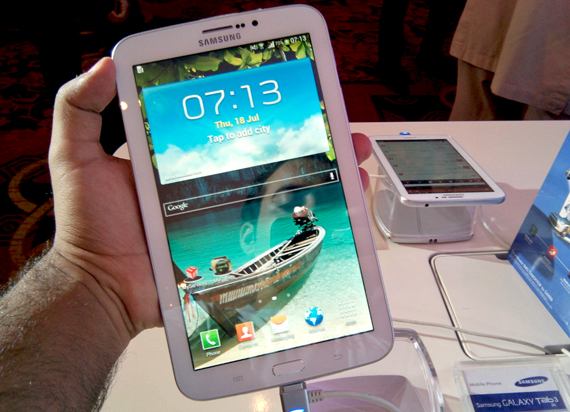
Jul 19: announced its new Galaxy Tab 3 range in London and now it seems the company is ready to bring these tablets to our shores. Earlier this morning, the South Korean company tweeted a teaser image of the tablet ahead of the launch event at Delhi tomorrow. Though it announced the 7, 8 and 10.1-inch variants in the Galaxy Tab 3 range, the Samsung India e-store listings show that we might only be getting the 7 and 8-inch tablets for now. That said, there are chances that the 10.1-inch Intel-powered tablet could be heading our way some time later.
Talking of the specifications, the Galaxy Tab 3 7.0 sports a 7-inch WSVGA (1024×600 pixels) display and is powered by a dual-core Marvell processor clocked at 1.2GHz and paired with 1GB of RAM.
Other features included are 3-megapixel rear camera, 1.3-megapixel front camera, 8GB of expandable internal storage, 4,000mAh battery and it will run on Android 4.1 Jelly Bean.
The Galaxy Tab 3 8.0, on the other hand, flaunts an 8-inch WXGA TFT (1280×800 pixels) display, which is similar to the one on the Galaxy Note 8.0 but without the stylus functionality.
The tablet includes features like 1.5GHz dual-core Exynos 4412 processor, Mali 400 GPU, 1.5GB of RAM, 5-megapixel rear camera, 1.3-megapixel camera on the front, 4,450mAh battery and 16GB of internal memory that can be expanded using a microSD card. Connectivity-wise, the tablet features Wi-Fi, Bluetooth 4.0, USB and A-GPS and on the software front, the device runs on Android 4.2 Jelly Bean.
Earlier reports have suggested that Samsung is likely to price the 7-inch tablet somewhere around Rs 12,000 and the 8-inch tab at around Rs 18,000 in India. We should have more information tomorrow when we report live from the Samsung event. So stay tuned.





Comments
Magnifico artículo, un placer leer el blog
Take a look at my weblog - http://bbs.sh.crystaledu.com/home.php?mod=space&uid=206920&do=profile&f…: http://bbs.sh.crystaledu.com/home.php?mod=space&uid=206920&do=profile&f…
Add new comment